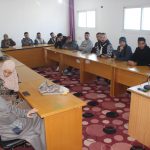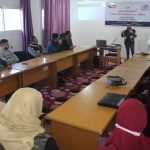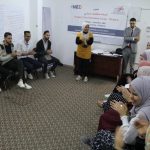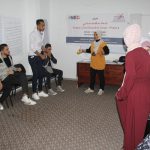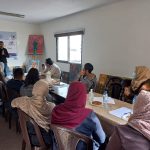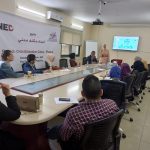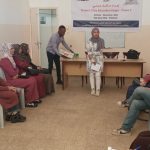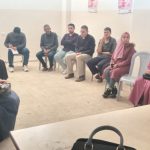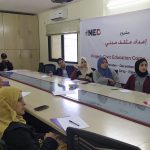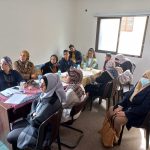As part of the second phase of the project “Civic Education Corps” that is implemented by Pal-Think for Strategic Studies and funded by the National Endowment for Democracy (NED) aiming at promoting democratic values and human rights concepts among young people in the Gaza Strip and creating youth leaders capable of disseminating these values in their society, Pal-Think has carried out five awareness sessions in various governorates of the Gaza Strip in cooperation with a number of civil society institutions.
The first session was carried out in cooperation with the United Cultural and Social Society in Rafah entitled: “The reality of political participation within the association” with the presence of a number of youth and union affiliates.
Bilal El-Najjar, a lawyer from Pal-Think, has opened the session welcoming the audience and stressing that Pal-Think constantly seeks to enhance the skills of young people and invest in their capacities. That it is by providing them with the opportunity to participate in the community and carrying out activities that would contribute to the dissemination of the concepts of democracy and human rights in the Palestinian society.
The session was conducted by members of the Civic Education: Ms Zainab Alastal and Mr Saied Issa on the reality of political participation within the association. They addressed the mechanisms and stages of political participation and the legal framework governing political participation. They have also talked about the issues of Palestinian youth, political participation and obstacles facing youth during the political participation process. They have emphasized that young people in Palestine need intensive efforts to make them more aware of the legal age of candidacy, the candidate mechanism and related regulations. Then they have moved to talk about joining unions as a form of political participation, reviewing the concept of associations, the concept of labor, the definition of union work. And they emphasized that the association is a permanent, independent and democratic public labor organization and an optional organization involving the same occupation aimed at defending labors’ rights and representing their profession and improving working conditions. At the end of the session, they overviewed the union organization in Palestinian legislation and a review was made on the role of women in trade union action, the reasons for their low participation, and mechanisms to increase the participation.
The second session was carried out in collaboration with the Nebras Association for social Development in Deir al-Balah entitled: “The Importance of Extracurricular Activities for University Students” by the Civic Education Member: Ms Tasnim Abu Mughsib. She addressed the concept of extracurricular activities and how to enhance students’ participation during the challenging university stage so that through these activities they can strengthen their capacities to meet those challenges and the required culture, effort and sustained action to overcome them. She also mentioned the importance of these activities in the university student’s life which in turn enhance their presence in society and make them competitive with their peers in the labor market after graduation. Also, she discussed the extent to which university students participated in such activities and their motivation to participate, and the reasons for non-participation as the fear of new relationships and new experiences were the most notable reasons. Despite that, the audience has confirmed that they prefer to participate in extracurricular activities and the importance of balancing them with practical life.
The third session was carried out in collaboration with Fares Al-Arab Association and attended by a number of university students. The session was moderated by Mr Nedal Abu Shrabi and Ms Soha Sokar, Civic Education members, entitled “Mechanisms for the Promotion of Women’s Rights in Society, the Concept of Gender and Gender Roles”
During the session, a discussion was held on mechanisms for the promotion of women’s rights in Palestinian society, the concept of gender and gender roles. And a series of measures were presented that should be taken into consideration to facilitate women’s empowerment of their right to political, social and legal participation. An activity was presented also illustrating the difficulties faced by women within Palestinian society and impeding their political participation.
The fourth session was carried out in cooperation with the Creative Women’s Association entitled: “The Right to Freedom of Movement and Travel”. It was moderated by the civic education member, Osama Naim. He outlined the concept of the right to freedom of movement and travel in the light of the Palestinian legal system and international human rights law and the gap between them. He emphasized that freedom of movement and travel is one of the human rights that is respected by the constitution in many countries which states that county citizens are free to travel, reside and work anywhere they wish from that country without infringing on the freedoms and rights of others, and can leave that country and return to it at any time. He also mentioned the most important challenges and obstacles facing Palestinian citizens and preventing them from exercising this right freely. At the end of the session, mechanisms to promote the right to freedom of movement and travel were reviewed and legislative reforms were needed in the Palestinian legal system in order to ensure the promotion of this right, as well as to create domestic and international pressure to safeguard this right and to put an end to violations of the right to movement and travel.
With regard to the fifth session which was carried out in cooperation with society for the care of disabled families in Rafah in the presence of a group of youth, it was entitled “The reality of democracy and political participation in the Palestinian situation”. The Civic Education member, Mr Abdullah Hassanen outlined the concept of democracy, political participation, and the levels and stages of political participation. And he reviewed the mechanisms for promoting political participation in the Palestinian society and its forms emphasizing that elections at all levels are among the most important forms of political participation. He clarified that the Palestinian society in the Gaza Strip had been deprived of the process of participation in any electoral process for nearly 15 years. That had affected the political participation rates in the Palestinian society, especially among youth and women.
Among the most important obstacles of the process of political participation, the Palestinian political division was the most notable obstacle, which hampered the process of peaceful deliberation of the Authority. He stressed the need for inclusive Palestinian elections in order to achieve active political participation on the ground.
The session included a series of discussions and questions which have been clarified and answered by the facilitators. The participants also stressed the importance of implementing such sessions which contribute to raising awareness among all groups in society.
It should be noted that these sessions are part of a series of sessions and activities to be carried out within the framework of the project: Civic Education Corps “2”. These also include preparing research papers that discuss issues and topics relating to democracy and human rights, as well as implementing radio podcasts and public sessions with the participation of members of Civic Education.


